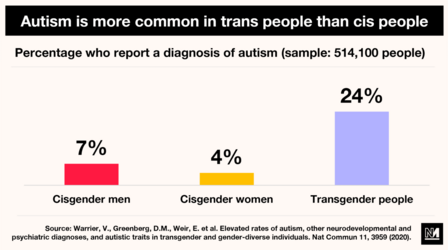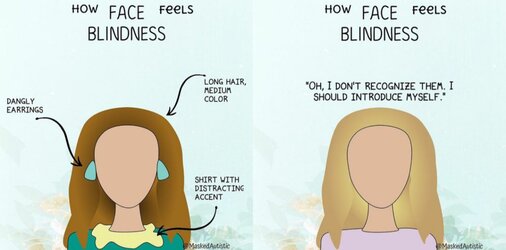Posting this here instead of derailing the Ls thread;
I can never quite decide if they know they do t pass and just get off on making people say they do or if they genuinely think that if you pick up enough girl accessories you get read as a girl. The latter is a weird thing to think.
Part of it is
who is posting it -

The study obviously is only one study in isolation of people diagnosed with autism (other studies do indicate the same thing) but we know a tonne of trans people are autistic (diagnosed or otherwise). Based off another study that came out in 2020, up to 40% of autistic people suffer from developmental prosopagnosia (compared to around 2% of the non-autistic population) - in other words, autistic people tend to struggle with face blindness way more than normal. Kevin Gibes himself admits having face blindness, and for an idea of
how face feels blindness how face blindness feels -

People with face blindness tend to rely on cues like a person's hairstyle, dress, accessories, voice etc to work out who's who (faceblind.org.uk even recommends face blind people keep a diary noting down "all the things you use to recognise an individual – hair, both style and colour, beards, glasses, ear-rings, body shape, piercings, tattoos, birthmark") and can easily not recognise someone, even someone they've known for a long time, if these change significantly.
It's possible to have partial prosopagnosia too - so even if it's not full blown face blindness, there can still be a reliance on looking at how someone's dressed in order to parse them - and so for a significant percentage of autistic people and therefore a significant percentage of trans people, how someone's dressed and presenting themselves may be the most noticeable thing about a person they're interacting with socially. So to an extent, the way they process people is a bit like one of those androgynous picrews they like to make avatars out of, where the only way you can tell if it's male or female is how it's presented:

Autistic people, depending on severity, may also struggle with intuitive thinking (gut instinct, hunches) over deliberative thinking (rules and logic), may have issues with sensory processing (influencing their perceptions as they can't integrate multiple sensory modalities, which can mean they focus on e.g. body language over appearance) and also can have difficulties with perspective-taking (understanding what someone else knows, sees, feels etc). I think that's what leads to some of the spergouts we see with "How did I get misgendered? I have short hair and am wearing a he/him pin and I know I am male, so why did that person not know?" or "I'm pre-HRT boymoding but I have started walking like a girl now and I feel very feminine, why do people keep assuming I'm a man?"
The other aspect is transformation and fetishism.
This VICE video is from 2016 and is an exploration of female maskers, which aren't the same thing, but give a certain amount of insight:
(I do recommend watching the full 15 minute thing as it's a fascinating if unsettling insight into female maskers, but from long enough ago that the tone could still be "these guys are super weird"). Despite turning themselves into nightmarish misshapen latex dolls, what many of these men are drawn to is how
not like themselves they look. There's a whole other gumbo of fetishes going on there (dehumanisation etc) but they are completely unrecognisable. The reason I bring it up is because that seems to be what's going on a lot of the time when the egg "cracks" and how you end up with timelines like this:

We can look at the second photo and recognise "that's a man". But I'm sure the person taking the photo focuses on how they're
different from when they presented like a man - the long hair, the makeup, the dresses, the clean shave; these are all such a contrast to how they used to look and since they're the aspects of fascination they focus on them
more. I think this is why "clocking" can seem so devastating as it snaps them out of this reverie, beautifully exhibited in this poem:

The emphasis is on stuff that feeds into the fantasy - a silk dress, glowy skin, a high pitched voice - but when the reality is brought up (even a child can recognise you're still a man) it's so upsetting that they throw a quesadilla at a wall and then publish a poem about it.
Over time perhaps the perceived difference wears off, and then the hyperfocus on passing (like those bizarre threads you see like "are my teeth too masculine") or the need for reassurance emerges. It's adroitly summed up in that doll documentary -
- the need to be witnessed. In that case it's maybe more of a chasing-the-dragon thing, where to feel the same sense of being transformed into a woman, they need to be
perceived by others as a woman (and that maybe blinds them to the fact that people are just being polite but don't perceive them as women).
There's undoubtedly stacks of Yaniv-types who know they don't pass and get off on a powerplay of
forcing people to deny what they're seeing, but I do think a bunch of them think they pass (or at least sometimes think they pass) and either don't understand why other people misgender them or freak out because it forces them to see themselves more accurately.




